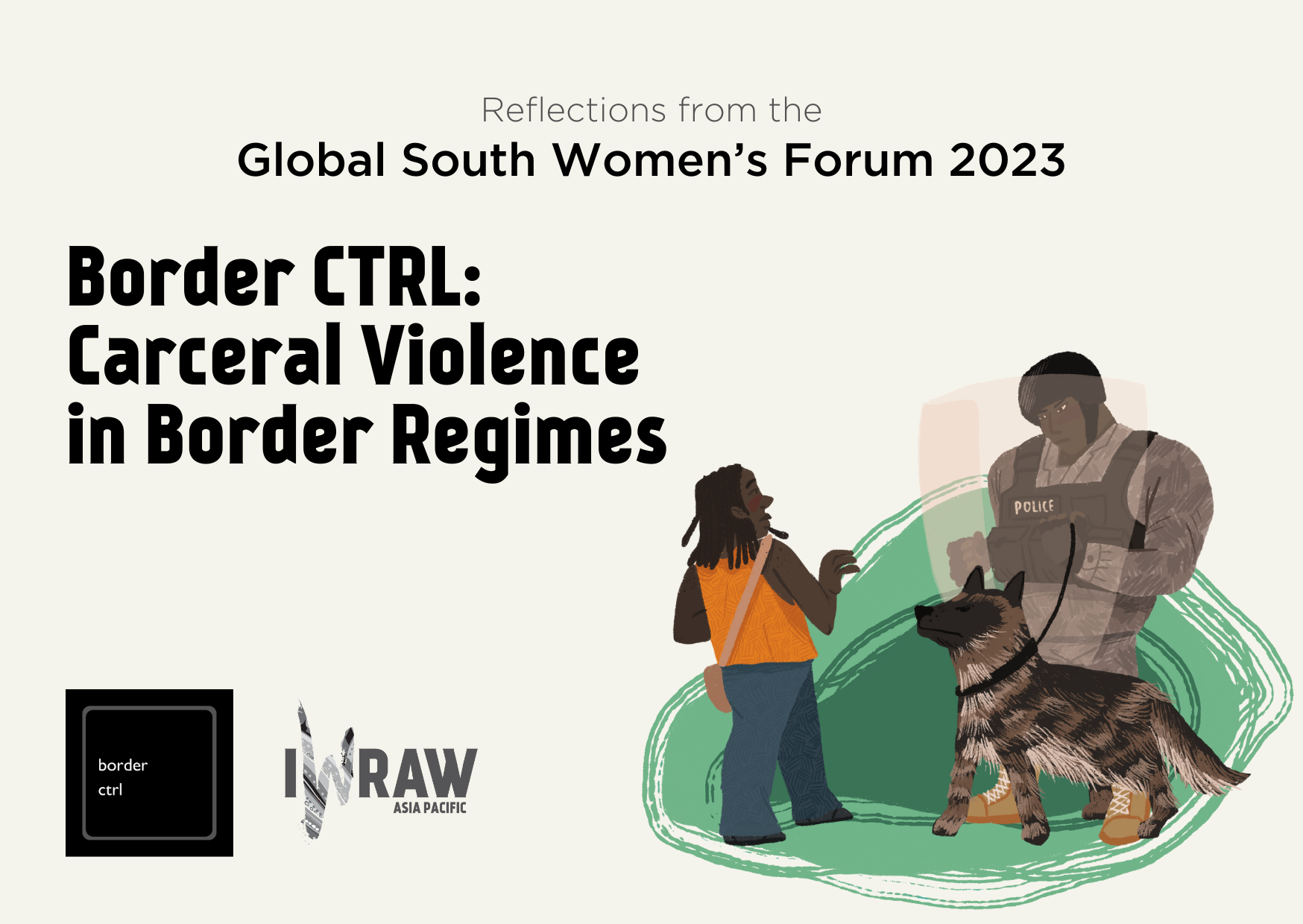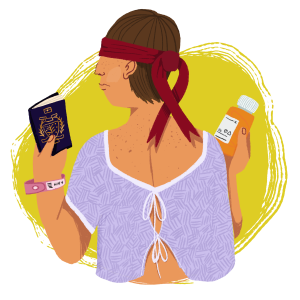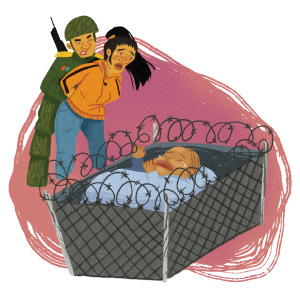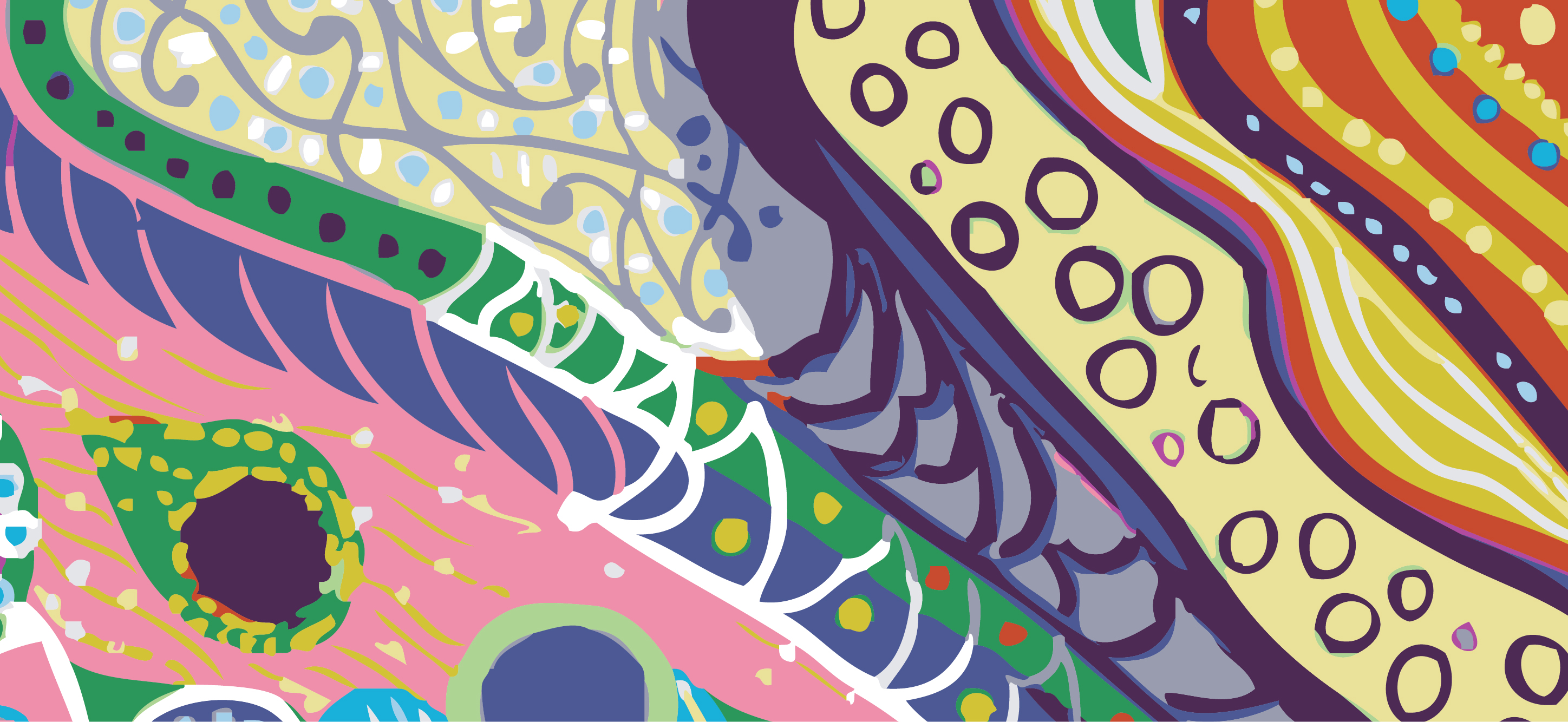
In the second instalment of our three-part blog series, we go deeper into the pervasive issue of carceral violence within border regimes. Building upon the foundations laid in our first post, which examined a global preoccupation with the documentation of migrants, travellers, and other non-citizens, we explore how systemic oppression and profit-driven incentives intersect to perpetuate human rights violations against migrants.
At the Global South Women’s Forum 2023, this strand aimed to analyse and shed light on the often overlooked economic and political interests that drive such violence. It particularly focused on women migrants transiting through North Africa, women living with HIV, sex workers, and Black women and girls, whose intersecting identities render them especially vulnerable to these abuses. Through their stories, participants articulated the urgent need for systemic change and advocated for the protection of human rights for all migrants.
Carceral violence – rooted in racism, particularly anti-Blackness; xenophobia; and intersecting forms of discrimination – extends the punitive arm of state authority to those deemed undesirable or criminal. This approach not only results in the mistreatment and abuse of migrants but also serves as a mechanism to maintain power dynamics and social control.
The framing of migration as a security issue has provided a pretext for the expansion of carceral regimes. Characterising migration as a problem to be managed, states have turned to prisons and policing as default responses. Prison systems which already disproportionately impact racialised and otherwise marginalised members of the citizen population have been expanded through immigration detention and other security measures targeting non-citizens. This regressive approach cements xenophobia in the public consciousness, while creating profitable opportunities for corporations involved in the border industry.
Private firms play a significant role in the perpetuation of carceral violence by handling outsourced visa processing, operating immigration detention centres, and overseeing physical deportations. Moreover, collaborations between tech companies and border agencies have led to the development of sophisticated surveillance tools used to monitor and control the movement of people. The use of facial recognition technology and predictive analytics by border agencies has raised concerns about not only privacy but also racial profiling and gender stereotyping, while the implementation of safeguards against abuse appears to be of lesser priority.
Beyond outsourcing border controls to private corporations, wealthy states in the North additionally outsource the task to countries in the Global South. An example is the EU’s border externalisation policies and their associated funding, which have encouraged and perpetuated egregious human rights abuses against migrants in the Mediterranean and North Africa. These abuses include pushbacks, torture, forced labour, and trafficking for the purposes of sexual exploitation. In her presentation on Eritrean women, Niat Hailemariam highlighted the widespread abuse of Black migrants in North African detention centres. This border externalisation has nonetheless become a conditionality for aid to developing countries, perpetuating systems of oppression and exploitation in international relations. By making aid contingent on the enforcement of stringent border controls, wealthy nations not only export these repressive measures but also exacerbate the vulnerabilities of migrant populations.
Even migrant worker programmes, ostensibly created to facilitate labour migration, have become sites of carceral violence. For instance, in numerous countries in the Middle East, as well as in Malaysia, migrant workers’ legal status is tied to their employers. At times, this dependency is compounded by the confiscation of workers’ documents, which serves to keep them captive in places of employment, facilitating exploitation and abuse. Other workers have no formal migration pathways to begin with: in the session ‘Women living with HIV at the Crossroads’, Josephine Achieng emphasised the importance of decriminalising sex work as a crucial step towards mitigating the intersecting forms of violence faced by sex workers who are also migrants. Without this, predators are empowered to target migrant sex workers with impunity.

Illustration by Appolonia Tesera for GSWF 2023
The impact of all these carceral efforts is far-reaching. For example, Josephine Achieng highlighted that stigma and lack of psychosocial support for migrant women living with HIV severely affects mental health, creating significant barriers to wellbeing. Criminalisation of HIV and limited migration pathways exacerbate existing vulnerabilities, increasing the possibility that such individuals will encounter the carceral system. The speakers at GSWF 2023 felt it crucial to recognise and collectively challenge these negative impacts in order to create a more equitable and humane society.

Illustration by Appolonia Tesera for GSWF 2023
Complexities surrounding transnational surrogacy were explored on the last day of the forum, in a session which examined the ethical dilemmas, legal uncertainties, and challenges in cross-border movement faced by women acting as surrogates, intending parents, and children born from these arrangements. Much like sex work, the criminalisation of surrogacy negatively impacts women acting as surrogates, regardless of whether they themselves face penalties or are cast solely as victims. Punitive measures ignore the distinction between consensual surrogacy agreements and coercive practices, and risk driving the practice underground – reducing prospects for informed consent, clear and ethical guidelines, and adequate protection for all parties.
In one instance in 2020, women acting as surrogates in Cambodia faced the threat of imprisonment unless they agreed to keep the children they had carried until they reached 18 years of age. If they handed over the children to the intending parents, they would face additional years behind bars. Also highlighted was a complex transnational scenario in which a woman travelled to a country where surrogacy was permissible, but, due to her home country’s criminalisation of surrogacy, lacked sufficient knowledge to navigate the arrangement, making her more vulnerable to manipulation. These examples made it clear that a human-rights-focused approach is needed to address the issue.
The speakers in these sessions stressed that carceral violence within border regimes is a multifaceted issue rooted in systemic oppression, profit-driven incentives, and collaboration between state and corporate actors. They put forward recommendations rooted in holistic approaches aimed at dismantling the systems of oppression that perpetuate human rights violations against migrants. Only through collective action and advocacy – centering the voices and experiences of the non-citizens who are on the receiving end – can we hope to create a more just and equitable world for all.
Olga Septemba is a passionate human rights practitioner and feminist, dedicated to advocating for marginalised communities, particularly those affected by forced migration. With extensive experience in addressing sexual and gender-based violence, she has worked to support individuals facing discrimination, displacement, and disability in Uganda, always striving to ensure protection and dignity. Grounded in intersectionality, Olga’s approach addresses the complex challenges faced by migrant populations. Through her Interrogating Borders fellowship with IWRAW Asia Pacific, she organised convenings for women affected by border-related marginalisation, shaping advocacy priorities, expanding networks of peacebuilders, and fostering intergenerational collaboration.
Nine leads IWRAW Asia Pacific’s programme Interrogating Borders and their Impact on Women’s Human Rights. She is driven by an interest in the necropolitics of bordering practices, and the intersections of oppression and privilege which influence the outcomes of migration journeys. As co-founder of Garabtaag, she coordinates grassroots assistance to refugees in Malaysia; and as a new migrant in Malta, she is a member of Malta LGBTIQ+ Rights Movement (MGRM)’s working group on asylum and migration.

